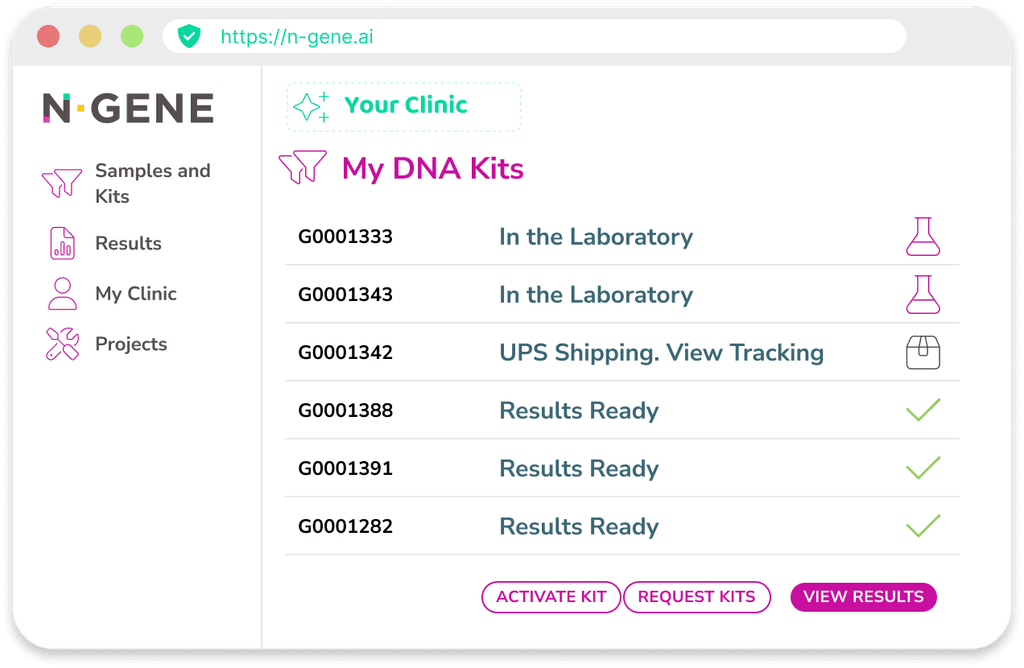The genetic solution for cardiologists
The genetic solution for cardiologists
The genetic solution for cardiologists
Integrate genetics into your practice with N-Gene, the software for heart professionals that offers personalized solutions to your clients with genetic studies and helps grow your business.
Integrate genetics into your practice with N-Gene, the software for heart professionals that offers personalized solutions to your clients with genetic studies and helps grow your business.



The most comprehensive
Explore our solutions
The most comprehensive
Explore our solutions
Multiple variants
Explore the predisposition and protection to:
Cardiovascular diseases
Coronary artery disease
Coronary artery disease: variants in genes such as APOE, LPL, and LDLR can influence cholesterol and triglyceride levels, increasing the predisposition to this condition characterized by the buildup of plaques in the arteries that supply blood to the heart.
Atrial fibrillation
The genetic predisposition to atrial fibrillation may involve variants in genes such as PITX2, ZFHX3, and KCNE1. These genes regulate cardiac electrical conduction, heart rhythm stability, and the function of ion channels, contributing to heart rhythm disturbances.
Hypertension
Blood pressure regulation is influenced by genes such as AGT and ACE, where certain variants may predispose individuals to increased sodium retention and altered vascular response, increasing the risk of hypertension.
Stroke
The predisposition to stroke or cerebrovascular accident may be influenced by genetic variants in genes related to blood coagulation, vascular function, and blood pressure. Genes such as MTHFR, APOE, and ACE have been associated with an increased risk due to their role in regulating cerebral blood flow, clot formation, and the inflammatory response.
Myocardial infarction
Polymorphisms in 9p21, a genetic region associated with vascular inflammation, have been linked to an increased risk of myocardial infarction, especially in people with a family history.
Thrombosis
The predisposition to thrombosis may be influenced by genetic variants in genes such as F5, F2, and MTHFR. These genes are involved in blood coagulation. For example, mutations in the F5 gene, which encodes factor V, can lead to a form resistant to inactivation by activated protein C, increasing the risk of blood clot formation.
Cardiovascular diseases
Coronary artery disease
Coronary artery disease: variants in genes such as APOE, LPL, and LDLR can influence cholesterol and triglyceride levels, increasing the predisposition to this condition characterized by the buildup of plaques in the arteries that supply blood to the heart.
Atrial fibrillation
The genetic predisposition to atrial fibrillation may involve variants in genes such as PITX2, ZFHX3, and KCNE1. These genes regulate cardiac electrical conduction, heart rhythm stability, and the function of ion channels, contributing to heart rhythm disturbances.
Hypertension
Blood pressure regulation is influenced by genes such as AGT and ACE, where certain variants may predispose individuals to increased sodium retention and altered vascular response, increasing the risk of hypertension.
Stroke
The predisposition to stroke or cerebrovascular accident may be influenced by genetic variants in genes related to blood coagulation, vascular function, and blood pressure. Genes such as MTHFR, APOE, and ACE have been associated with an increased risk due to their role in regulating cerebral blood flow, clot formation, and the inflammatory response.
Myocardial infarction
Polymorphisms in 9p21, a genetic region associated with vascular inflammation, have been linked to an increased risk of myocardial infarction, especially in people with a family history.
Thrombosis
The predisposition to thrombosis may be influenced by genetic variants in genes such as F5, F2, and MTHFR. These genes are involved in blood coagulation. For example, mutations in the F5 gene, which encodes factor V, can lead to a form resistant to inactivation by activated protein C, increasing the risk of blood clot formation.
Cardiovascular diseases
Coronary artery disease
Coronary artery disease: variants in genes such as APOE, LPL, and LDLR can influence cholesterol and triglyceride levels, increasing the predisposition to this condition characterized by the buildup of plaques in the arteries that supply blood to the heart.
Atrial fibrillation
The genetic predisposition to atrial fibrillation may involve variants in genes such as PITX2, ZFHX3, and KCNE1. These genes regulate cardiac electrical conduction, heart rhythm stability, and the function of ion channels, contributing to heart rhythm disturbances.
Hypertension
Blood pressure regulation is influenced by genes such as AGT and ACE, where certain variants may predispose individuals to increased sodium retention and altered vascular response, increasing the risk of hypertension.
Stroke
The predisposition to stroke or cerebrovascular accident may be influenced by genetic variants in genes related to blood coagulation, vascular function, and blood pressure. Genes such as MTHFR, APOE, and ACE have been associated with an increased risk due to their role in regulating cerebral blood flow, clot formation, and the inflammatory response.
Myocardial infarction
Polymorphisms in 9p21, a genetic region associated with vascular inflammation, have been linked to an increased risk of myocardial infarction, especially in people with a family history.
Thrombosis
The predisposition to thrombosis may be influenced by genetic variants in genes such as F5, F2, and MTHFR. These genes are involved in blood coagulation. For example, mutations in the F5 gene, which encodes factor V, can lead to a form resistant to inactivation by activated protein C, increasing the risk of blood clot formation.
Valvular and aortic pathologies
Valvular and aortic pathologies
Valvular and aortic pathologies
Diseases - Circulatory System
Diseases - Circulatory System
Diseases - Circulatory System
Save time
Save time
Explore genetic data easily
Register your patients
Request kits and pickups
Generate reports in PDF
Receive AI-powered insights
Register your patients
Monitor the progress of your clients' samples efficiently: assign an alias to every sample and track its status instantly

Register your patients
Request kits and pickups
Generate reports in PDF
Receive AI-powered insights

Register your patients
Monitor the progress of your clients' samples efficiently: assign an alias to every sample and track its status instantly
Register your patients
Request kits and pickups
Generate reports in PDF
Receive AI-powered insights

Register your patients
Monitor the progress of your clients' samples efficiently: assign an alias to every sample and track its status instantly
Shall we talk?
Shall we talk?
Shall we talk?
Contact and request a demo without obligation
Contact and request a demo without obligation
Contact and request a demo without obligation
Our experts will provide you with a demonstration of N-GENE and will answer all your questions. Discover all the advantages of integrating genetics into your practice.
Our experts will provide you with a demonstration of N-GENE and will answer all your questions. Discover all the advantages of integrating genetics into your practice.
Our experts will provide you with a demonstration of N-GENE and will answer all your questions. Discover all the advantages of integrating genetics into your practice.
Contact us via WhatsApp

Do You Need to Know More?
Frequently Asked Questions
Frequently Asked Questions
Do I need to be an expert in genetics to interpret the reports?
Do I need to be an expert in genetics to interpret the reports?
Do I need to be an expert in genetics to interpret the reports?
How do I collect the samples from my patients?
How do I collect the samples from my patients?
How do I collect the samples from my patients?
Are the results reliable?
Are the results reliable?
Are the results reliable?
Can this test be used as a diagnosis?
Can this test be used as a diagnosis?
Can this test be used as a diagnosis?
Where do I send the samples and what technology do you use?
Where do I send the samples and what technology do you use?
Where do I send the samples and what technology do you use?
Is it necessary to repeat the test after a few months?
Is it necessary to repeat the test after a few months?
Is it necessary to repeat the test after a few months?
How is the privacy of the samples handled?
How is the privacy of the samples handled?
How is the privacy of the samples handled?
Discover how N-GENE can transform your medical consultation
Discover how N-GENE can transform your medical consultation
Fundamental today, essential tomorrow
The genetic reports from N-GENE are informative and preventive. They do not constitute a medical diagnosis nor do they substitute for individual clinical assessment.
The genetic reports from N-GENE are informative and preventive. They do not constitute a medical diagnosis nor do they substitute for individual clinical assessment.
The genetic reports from N-GENE are informative and preventive. They do not constitute a medical diagnosis nor do they substitute for individual clinical assessment.







